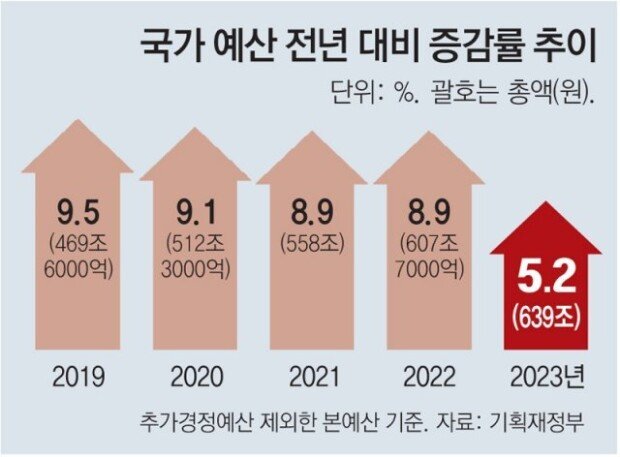Budget for 2023 shows the lowest increase in six years
Budget for 2023 shows the lowest increase in six years
Posted August. 31, 2022 07:43,
Updated August. 31, 2022 07:43

The South Korean government announced a national budget of 639 trillion won for the next fiscal year, reporting an increase of 5.2 percent from this year’s. This is the second smallest increase since 2017 (3.7%). The budget proposal reduced spending of 24 trillion won, which is the biggest reduction in history, to minimize the expenditures.
The welfare assistance for the socially vulnerable and marginalized group has increased, totaling over 100 trillion won for the first time. A sum of 11 trillion won has been allocated to deliver President Yoon Suk-yeol’s campaign promise, including an increased monthly wage for sergeants to 1.3 million won.
On Tuesday, the Cabinet finalized the 2023 budget proposal to this effect. Minister of Finance Choo Kyung-ho said that the national debt has increased by 14 percentage points for the past five years, amounting to 1,100 trillion won. “Economic hardships are expected to continue for a long time, and shifting from a lax fiscal policy to a sound one is indispensable especially for the future generation,” Minister Choo said. “We must learn to practice economy,” said the finance minister.
Highlighting sound fiscal policy, the Yoon administration finalized its first budget proposal, which managed to keep the increase in total spending to 60 percent of the average yearly increase (8.7 percent) under the former Moon Jae-in administration. The government plans to drop the rate of increase in total spending to 4.2 percent by 2026. The total spending, including this year’s supplementary budget, has decreased by 6.3 percent. It is first in 13 years that the government spending, in terms of the annual total expenditures including supplementary budget, has decreased from the previous year.
The government has cut additional 24 trillion won in expenditures in order to reduce the reliance on debts, increase welfare assistance for the vulnerable and marginalized groups, and revitalize the economy. This is twice as much as the previous reduction, which was roughly 10 trillion won. The budget earmarked for local consumption coupons has been cut down, and the budget for job creation has also been slashed by 4.9 percent year-on-year (approximately 1.5 trillion won). The annual wage for civil servants below Grade 5 will be increased by 1.7 percent, while the annual wage for civil servants above Grade 4 will be frozen. High ranking public officials above the ministerial and vice-ministerial level will return 10 percent of their wages to the government.
Government debt to GDP will be cut down by 0.2 percentage points to 49.8 percent from this year’s 50 percent. The government plans to keep the government debt-to-GDP ratio at 52.2 percent by 2026. The budget proposal for the next fiscal year will be submitted on Friday to the National Assembly, which has to deliberate on and deliver a resolution by the statutory due date of Dec. 2.
Hee-Chang Park ramblas@donga.com · Hye-Ryung Choi herstory@donga.com







